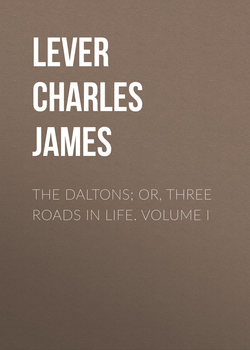Читать книгу The Daltons; Or, Three Roads In Life. Volume I - Lever Charles James - Страница 13
CHAPTER XII. MR. ALBERT JEKYL
ОглавлениеONSLOW’S first thought, on awaking the next morning, was of last night’s acquaintance, but all the information he could obtain concerning him was that he was an Englishman who had passed the summer in Baden, and during the season knew and was known by every one. The waiter called him, in the usual formulary, “a very nice gentleman;” and seemed by his manner to infer that any further account might be had by paying for it. Onslow, if he even understood the hint, was not the man to avail himself of it; so he simply ordered him to bring the hotel book, in which the names of all travellers are inscribed, and at once discovered that the proprietor of the humble entresol, No. 6, was a Mr. Albert Jekyl, with the ordinary qualification attached to him of “Rentier Anglais.” Searching back in the same instructive volume, he found that, on his arrival in June, Mr. Jekyl had occupied a small apartment on the first floor, from which he had subsequently removed to the second; thence to a single room in the third story, and finally settled down in the quiet seclusion of the small chamber where George had first seen him. These were very small materials from which to compile a history, but at least they conveyed one inference, and that a very common one, that the height of Mr. Jekyl’s fortune and that of his dwelling observed to each other an inverse proportion, and that, as his means went down, he went up. If, then, no very valuable contribution to the gentleman’s history was contained here, at least the page recorded his name; and George, reopening Norwood’s letter, satisfied himself that this was the same confiding individual who had intrusted the noble viscount with a loan of twenty pounds. George now remembered to have seen his card on Lady Hester’s table, with inquiry after Sir Stafford. “Poor fellow!” thought he; “another victim of ‘trente-et-un.’ They have cleared him out at the tables, and he is either ashamed to write home, or his friends have refused to assist him. And Norwood, too the heartlessness of putting to contribution a poor young fellow like this!” Onslow thought worse of this than of fifty other sharp things of the noble Lord’s doing, and of some of which he had been himself the victim.
“I’ll call upon him this very morning!” said George, half aloud, and with the tone and air of a man who feels he has said a very generous thing, and expressed a sentiment that he is well aware will expose him to a certain amount of reprobation. “Jekyl, after all, is a right good name. Lady Hester said something about Jekyls that she knew, or was related to. Good style of fellow he looked a little tigerish, but that comes of the Continent. If he be really presentable, too, my Lady will be glad to receive him in her present state of destitution. Norwood’s ungracious message was a bore, to be sure, but then he need not deliver it there was no necessity of taking trouble to be disagreeable or, better again far better,” thought he, and he burst out laughing at the happy notion, “I ‘ll misunderstand his meaning, and pay the money. An excellent thought; for as I am about to book up a heavy sum to his Lordship, it ‘s only deducting twenty pounds and handing it to Jekyl, and I ‘ll be sworn he wants it most of us all.”
The more Onslow reflected on it, the more delighted was he with this admirable device; and it is but fair to add, that however gratified at the opportunity of doing a kindness, he was even better pleased at the thought of how their acquaintance at the “Grosvenor” and the “Ultras” would laugh at the “sharp viscount’s being sold.” There was only one man of all Onslow’s set on whom he would have liked to practise this jest, and that man was Norwood. Having decided upon this plan, he next thought of the execution of it, and this he determined should be by letter. A short note, conveying Norwood’s message and the twenty pounds, would save all explanation, and spare Jekyl any unpleasant feeling the discussion of a private circumstance might occasion.
Onslow’s note concluded with his “thanks for Mr. Jekyl’s kindness on the preceding evening,” and expressing a wish to know “at what hour Mr. J. would receive a visit from him.”
